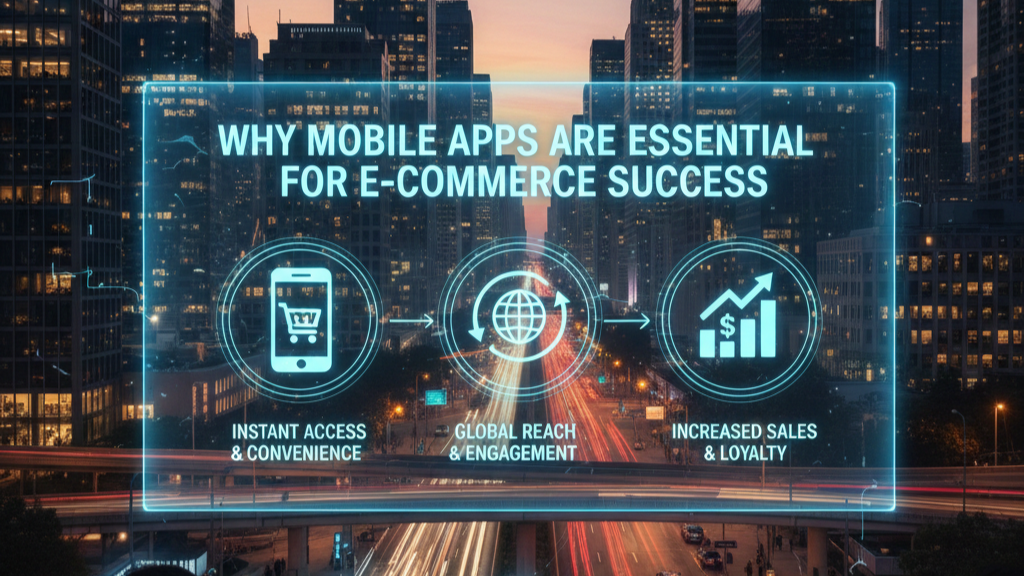The rapid growth of mobile technology has revolutionized how consumers shop online. With smartphones becoming ubiquitous, e-commerce businesses must adapt to remain competitive. One transformative strategy is investing in mobile apps. This blog explores why mobile apps are essential for e-commerce success, offering insights that cater to both beginners and seasoned professionals.
1. Unmatched User Experience
Mobile apps provide a smoother and more personalized shopping experience than mobile websites. Features such as:
- Faster Loading Times: Apps load content quicker than responsive websites, reducing bounce rates.
- Offline Access: Certain functionalities, like browsing saved products or accessing account details, can work without an internet connection.
- Ease of Navigation: Intuitive design tailored for mobile devices ensures users can browse and shop with minimal effort.
Discover key UX design tips for mobile apps.
2. Enhanced Customer Engagement
A mobile app keeps your brand at your customers’ fingertips. Features like push notifications enable businesses to:
- Send personalized offers
- Announce flash sales
- Remind users about abandoned carts
These proactive interactions boost engagement and drive conversions. Learn more about crafting effective push notifications.
3. Increased Customer Loyalty
Mobile apps foster a deeper connection with customers. Integrating loyalty programs and rewards directly into the app encourages repeat purchases. For example:
- Reward points for every purchase
- Exclusive app-only discounts
- Personalized recommendations based on browsing history
Explore strategies for building customer loyalty through apps.
4. Better Data Collection and Insights
Mobile apps offer robust analytics capabilities, allowing businesses to:
- Monitor user behavior
- Analyze purchase patterns
- Tailor marketing strategies
This data provides invaluable insights into customer preferences and helps optimize the shopping experience. Check out tools for mobile app analytics.
5. Higher Conversion Rates
Statistics consistently show that mobile apps outperform websites in driving conversions. With features like:
- One-Click Checkout: Streamlined payment processes reduce friction.
- In-App Recommendations: AI-driven product suggestions increase basket sizes.
- Integrated Payment Gateways: Offering multiple payment options simplifies the checkout process.
Read about the importance of seamless payment integration.
6. Improved Brand Visibility
Having a dedicated app icon on a user’s home screen reinforces brand presence daily. Combined with app-exclusive features, this constant visibility strengthens brand recall and positions your business as a leader in your niche. Explore tips for enhancing app visibility.
7. Expanding to Omnichannel Strategies
Mobile apps play a crucial role in omnichannel e-commerce strategies. By synchronizing data across platforms, apps enable customers to:
- Start shopping on one device and finish on another
- Access consistent promotions across channels
- Enjoy a unified customer support experience
Learn how omnichannel strategies enhance customer experience.
8. Scalability for Business Growth
As your business grows, a mobile app can scale alongside it. Features like advanced search filters, AI-driven chatbots, and integrated CRM systems make handling increased traffic and inventory seamless.
Explore scalable app development solutions.
9. Staying Ahead of the Competition
With more businesses embracing mobile apps, not having one puts you at a disadvantage. Investing in a robust, user-friendly app positions your brand ahead of competitors who rely solely on mobile websites.
Discover how to stay competitive in e-commerce.
Case Studies: Success Stories


- ASOS: This global fashion retailer leverages its mobile app for personalized shopping experiences, offering tailored product recommendations and app-only discounts. Result? A significant increase in user retention and sales.
- Starbucks: With a focus on loyalty, the Starbucks app integrates a rewards system and mobile ordering. This strategy has boosted customer engagement and streamlined in-store operations.
Conclusion
Mobile apps are no longer a luxury but a necessity for e-commerce success. From enhancing user experience and engagement to boosting conversions and scalability, the benefits are undeniable. Whether you’re launching your first e-commerce store or optimizing an established business, a well-designed mobile app can transform your operations and elevate your brand.
Ready to take the plunge? Start by conducting thorough market research to identify the features your customers value most. Partner with a trusted app development team to create a user-friendly, feature-rich mobile app that aligns with your business goals.
With the right strategy, your mobile app can become a powerful tool to drive growth, improve customer satisfaction, and set your e-commerce business apart from the competition. The time to act is now!



